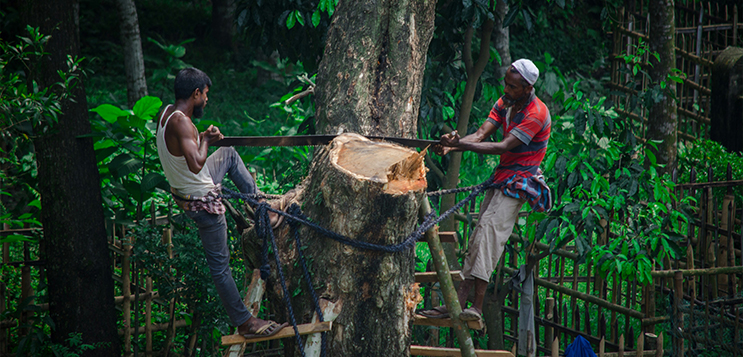
Deforestation is real. India’s forests in the Western Ghats, the North-East, and the central belt face relentless pressure from agriculture and plantations. Between 2001 and 2021, India lost over 2.3 million hectares of tree cover, (7.1% decline) primarily due to agricultural practices. Tackling this crisis is urgent. However, Europe’s new Deforestation Regulation (EUDR) highlights how climate policy can go awry when designed in distant capitals.
Brussels now insists that coffee, cocoa, palm oil, rubber, and soy entering Europe must be certified “deforestation-free.” It sounds like progress. It may look good in a press release, but for Indian farmers, it is a wall.
What does Europe want to do with EUDR?
The law requires geolocation data for every farm plot, which is matched against satellite images. In theory, it is clean and efficient. However, in practice, it is chaos. Indian farming is overwhelmingly small-scale. For starters, 86% of farmers cultivate less than two hectares, according to the Agriculture Census. These plots are fragmented, irregular, and often mixed with forest edges or other crops. Land records are messy. In some states, more than 60% of land holdings remain contested or lack updated titles. Thus, ensuring compliance with European mapping rules becomes nearly impossible.
The EUDR law also states that geolocation data for every farm plot is cross-checked with satellite images. But it is nearly impossible to do so in India. Most smallholders farm only a few acres of land. Their plots sit beside mixed land uses, making verification difficult. Land records remain outdated, fragmented, or contested. Accurate mapping becomes a technical nightmare.
Technology makes the gap starker. While India boasts the world’s cheapest data rates, only 31% of rural households own a smartphone. Internet access is patchy, digital literacy is limited, and farmers in remote regions often struggle to access stable electricity. Expecting a rubber tapper in Tripura or a coffee grower in Kodagu to provide GPS-tagged coordinates and digital compliance records is unrealistic.
EUDR and the huge burden of proof around deforestation
The burden of proof on deforestation trickles down. On paper, importers are liable, but in practice, exporters pass the cost to farmers. Compliance requires digital mapping, certification, and audits. A single certification audit can cost ₹40,000 to ₹50,000, a figure far beyond the reach of smallholders whose monthly incomes average less than ₹13,000, according to NABARD. Large agribusinesses absorb these costs, but what about the smallholders?
The irony is hard to miss. Non-compliant produce will not vanish but be redirected to less-regulated markets in Asia or Africa. Forests will still remain at risk. Yet, Brussels will still applaud supermarket shelves stocked with “deforestation-free” products.
There is also a stark double standard. In Côte d’Ivoire (Ivory Coast), the world’s largest cocoa producer, the EU has pledged €50 million in support, alongside other funding and a €150 million reforestation loan. These programs are designed to help Ivorian farmers adapt to the EUDR. However, the farmers in India, producing coffee, rubber, and soy for Europe, receive no such direct help. This begs the question: are some worthy of support while others are left to fend for themselves?
Who will help the farmers?
The imbalance runs deeper. European farmers receive €55 billion annually in subsidies through the Common Agricultural Policy to meet environmental standards. Indian farmers, by contrast, receive limited state support, often delayed or poorly targeted. The EU dictates rules abroad but does not fund their implementation. Once again, the Global South shoulders the cost of Europe’s conscience.
The EUDR also fits a bigger pattern. From the Carbon Border Adjustment Mechanism (CBAM) to stricter pesticide residue limits, Europe is rewriting global trade rules in the name of sustainability. However, without shared investment and cooperation, these frameworks risk becoming disguised trade barriers that exclude smallholders rather than transforming the agricultural sector.
Real sustainability extends beyond merely ticking boxes and fulfilling regulatory requirements. It means investing in farmers through training, affordable technology, and transparent land systems, and building genuine global partnerships. Europe must move beyond distant rulemaking and share responsibility for change. Only through shared commitment can we protect forests, support smallholders, and build a truly sustainable future.
